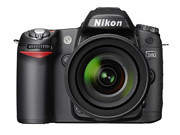Reading Strumpette’s take on the Nikon Camera D80 campaign, you might think it’s the end of the profession as Amanda Chapel (a pseudonym?) purports to lesson Michael Kempner, MWWGroup, on the ethics of their blogger program.
Don’t get me wrong, Chapel has a fine blog that works real hard offering a smattering of "spicy" public relations observations to lure in the willing or wicked or whatever. There is no question that Strumpette is a popular blog that reads as the polar opposite of Steve Rubel’s Micro Persuasion, one of my favorites.
This time, I don’t really agree with Chapel’s twist on the Nikon story. She claims this is blatant bribery or “blogola.” All I see is that there seems to be some rumbling from public relations professionals that maybe, just maybe, they don’t know whether the campaign is ethical or not. Ho hum.
For the most past, the blogger campaign seems to be a natural extension of “Picturetown” where Nikon gave away 200 cameras to the residents of Georgetown, S.C. ADWEEK’s Barbara Lippert recently wrote that there is “something really satisfying about basing an ad campaign on the real stuff of user-generated content. It bulks up the experience and democratizes the process, not only for picture takers, but also for the viewers.”
So why not bloggers? Eric Eggertson, who pens Common Sense PR, seems to think that it is okay.
“Should bloggers feel guilty if they end up paying the discounted price and keeping a valuable camera? Not in my book. I don’t really expect them to write negative things about the camera. What’s not to like about a top digital SLR from a top brand? There are too many settings?”
Joseph Jaffe of Jaffe Juice says “I have to tell you that in my humble opinion, this has been the best example of blogger outreach I have either experienced (first hand) or read about.” But then again, he has a camera so perhaps that doesn’t count. Or maybe it does because it is blogger outreach.
If we go back to the original definition of a bribe (money or favor given or promised in order to influence the judgment or conduct of a person in a position of trust), there still seems to be some holes in the ethical argument because MWWGroup never placed any conditions on the campaign like “you must write good things about it or send it back” or “you must use it every day.”
Nope. Other than asking the bloggers to include a campaign disclosure if they write a product review, which seems to be the opposite of a bribe, I don’t see any conditions that may influence these bloggers. In fact, it almost seems to me that the threat of making them appear influenced has a greater chance of skewing their objectivity. But that requires a different term all together.
Chapel says I underestimate the true dynamics of the issue. Not really. It seems to me the true dynamics of the issue is not being discussed enough. Public relations firms are being put in an unfair position: they are ridiculed for ignoring bloggers and chastised for inviting them to review products at the same time.
Fair reviews don’t just come from publications with product purchase budgets nor do they come from bloggers with deep purses. Fair reviews come from people who are true to themselves, whether or not they are invited to the opening, asked to take a test drive, or given a loaner.
Any other position is unfair to the reviewer as it attempts to guess their motivation at best and insults their ability to be objective at worst. Any other twisted facts on this issue would force us to conclude that we are all somehow unethical for sampling a cheese square at the local grocery store.
After 15 years of straddling the fence between public relations and journalism (five of those years editing a trade publication for concierges who ask similar questions), the best measure remains with the writer’s own sense of ethics. Better advice might be to resist the urge to name call, especially my readers, as it almost always erodes the name caller's credibility.
Ergo, MWWGroup has done a fine job wading into the waters of social media. While the Nikon campaign might be improved upon, there are virtually no details that deserve mention. They may even be given kudos for the experiment, especially because they tried so hard (maybe overly so) to remain above board.

Don’t get me wrong, Chapel has a fine blog that works real hard offering a smattering of "spicy" public relations observations to lure in the willing or wicked or whatever. There is no question that Strumpette is a popular blog that reads as the polar opposite of Steve Rubel’s Micro Persuasion, one of my favorites.
This time, I don’t really agree with Chapel’s twist on the Nikon story. She claims this is blatant bribery or “blogola.” All I see is that there seems to be some rumbling from public relations professionals that maybe, just maybe, they don’t know whether the campaign is ethical or not. Ho hum.
For the most past, the blogger campaign seems to be a natural extension of “Picturetown” where Nikon gave away 200 cameras to the residents of Georgetown, S.C. ADWEEK’s Barbara Lippert recently wrote that there is “something really satisfying about basing an ad campaign on the real stuff of user-generated content. It bulks up the experience and democratizes the process, not only for picture takers, but also for the viewers.”
So why not bloggers? Eric Eggertson, who pens Common Sense PR, seems to think that it is okay.
“Should bloggers feel guilty if they end up paying the discounted price and keeping a valuable camera? Not in my book. I don’t really expect them to write negative things about the camera. What’s not to like about a top digital SLR from a top brand? There are too many settings?”
Joseph Jaffe of Jaffe Juice says “I have to tell you that in my humble opinion, this has been the best example of blogger outreach I have either experienced (first hand) or read about.” But then again, he has a camera so perhaps that doesn’t count. Or maybe it does because it is blogger outreach.
If we go back to the original definition of a bribe (money or favor given or promised in order to influence the judgment or conduct of a person in a position of trust), there still seems to be some holes in the ethical argument because MWWGroup never placed any conditions on the campaign like “you must write good things about it or send it back” or “you must use it every day.”
Nope. Other than asking the bloggers to include a campaign disclosure if they write a product review, which seems to be the opposite of a bribe, I don’t see any conditions that may influence these bloggers. In fact, it almost seems to me that the threat of making them appear influenced has a greater chance of skewing their objectivity. But that requires a different term all together.
Chapel says I underestimate the true dynamics of the issue. Not really. It seems to me the true dynamics of the issue is not being discussed enough. Public relations firms are being put in an unfair position: they are ridiculed for ignoring bloggers and chastised for inviting them to review products at the same time.
Fair reviews don’t just come from publications with product purchase budgets nor do they come from bloggers with deep purses. Fair reviews come from people who are true to themselves, whether or not they are invited to the opening, asked to take a test drive, or given a loaner.
Any other position is unfair to the reviewer as it attempts to guess their motivation at best and insults their ability to be objective at worst. Any other twisted facts on this issue would force us to conclude that we are all somehow unethical for sampling a cheese square at the local grocery store.
After 15 years of straddling the fence between public relations and journalism (five of those years editing a trade publication for concierges who ask similar questions), the best measure remains with the writer’s own sense of ethics. Better advice might be to resist the urge to name call, especially my readers, as it almost always erodes the name caller's credibility.
Ergo, MWWGroup has done a fine job wading into the waters of social media. While the Nikon campaign might be improved upon, there are virtually no details that deserve mention. They may even be given kudos for the experiment, especially because they tried so hard (maybe overly so) to remain above board.



















